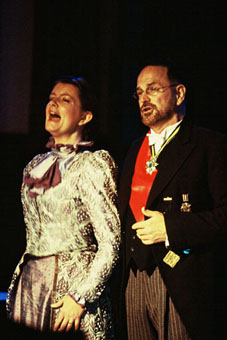Magical museological music theatre
Jonathan Marshall

Jeannie Marsh, Grant Smith, Love, Death, Music and Plants: A musical infringement on the life of Baron Ferdinand von Mueller
photo Rachelle Roberts
Jeannie Marsh, Grant Smith, Love, Death, Music and Plants: A musical infringement on the life of Baron Ferdinand von Mueller
Love, Death, Music and Plants is the latest production from writer/director Brian Lipson. Continuing the style Lipson developed for his solo performance A Large Attendance in the Antechamber (2000), the dramaturgy and mise en scène of Love, Death… functions according to an essentially museological logic. Lipson’s staging is consistent not only with his chosen topic, but also with the building which houses the piece—the National Herbarium of Victoria. Lipson creates a space within which characters, words and songs are mounted and placed within semi-static tableaux.
The opening image of the former botanist and director of the Herbarium laid out on a wooden slab like one of the many specimens that surround him, fussed over by the botanists of today, remains in the eye and senses of the audience throughout the performance, imparting a density and materiality to this production which summons those ghosts that adhere to objects and spaces from across time. The depth of this museological approach is strikingly effective—every movement and every gesture has a firmness and weight through Lipson’s careful judging of spatial volume and depth for each on-stage position. Diagonals from corner to corner, horizontals at the back or slightly forward of the rear wall carefully offset pairings and other directional axes: these are the coordinates of 19th century rationalism, science and botanical classification embodied in Lipson’s dramaturgy.
The set elements and objects (tables, cases, dresses, hats, coats, specimens) do not so much dance within the performance as move along invisible yet fiercely determined corridors within the space. It is here that the libretto, music and especially the use of voice is so crucial. Love, Death… is not just an homage to 19th century Victorian botanist Ferdinand von Mueller. It is also a critique of the man and his values. Alongside this dramaturgical clarity of line and space which the display of specimens in museums and herbaria has embodied since Mueller’s time, there is also a sense of the poetic, of flow and dance, as the voice and the score play with the conventions of classicism, opera and gentle atonalism.
The closing image of Mueller, dressed in glowing, spectral white, standing in the gardens outside the Herbarium while singing in falsetto to a spreading Moreton Bay fig perfectly reciprocates the opening tableau. Here the dreams of the earlier prone, sleeping figure are allowed full flight in the form of pure voice and sound, in speech and text which strokes and seduces the surface of the bark and the ear.
This interplay between 2 models of life and experience—the rational and the poetic—is most fully realised when Mueller sings to his would-be fiances. The botanist becomes Pygmalion, but at several key points it’s he who is transformed, shaped and classified by his feminine role models, rather than him sculpting them into his ideals. Mueller’s first rejected fiance, Euphemia Henderson, dresses herself in the botanist’s own authoritative top hat and coat to sing in loud, sour, sarcastic tones of how she/he “picks” and “dries”, “samples” and “presses”: “I grunt … I groan,/ sleep briefly, excrete infrequently,/ eat bleakly alone…/ …and worship / a white goddess.” As Mueller himself takes up similar themes, a degree of vocal and imaginative transvestism creeps into the performance.
The clear distinctions of Mueller’s professional life, between sedges and heaths, eucalypts and deciduous, break down at the most fundamental distinction within his personal life: between man and woman, husband and wife. Mueller is in the end “unsexed” by his own obsessive actions—like Lady Macbeth, though less violently. It is therefore finally both Lipson and we, the audience, who mount Mueller on a pin; who turn him one way and another to gaze at his barked sides. The spectator and the director come to stand in for Euphemia, effeminising the great man as we hear his voice slip out of conventional masculine range. Love, Death… thus not only unleashes the expansive genius of 19th century science and classification, but also the demons and sprites that dwelt deep within their roots; the poetic beauty of a vision of an orderly universe mapped and possessed, as well as the tragedy that lurked within the didacticism and impossibility of this project.
Love, Death, Music and Plants: A musical infringement on the life of Baron Ferdinand von Mueller, director/writer Brian Lipson, composer Matthew Hindson, musical director Mark Shiell, lighting Chris Sanders, design Andrew Bailey, producer/performer Jeannie Marsh (Euphemia Henderson), performer Grant Smith (Mueller), The Baron’s Choir; Mueller Hall, National Herbarium of Victoria, Nov 18-30, 2003
RealTime issue #59 Feb-March 2004 pg. 44






